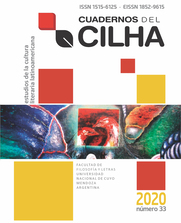Saber o mentir: la conformación afectiva del poder según Las facultades
Palabras clave:
Afecto, Poder, Ansiedad, Incertidumbre, Eloísa SolaasResumen
La teoría sobre los afectos conformada según el giro afectivo nos ha acostumbrado a repetir una serie de características clave del orden en cuestión: que se trata de la capacidad de afectar y ser afectado, que los afectos son performativos y que la dimensión afectiva así planteada cuestiona una serie de binarismos clave –razón/emoción; cuerpo/mente; interior /exterior-. Efectivamente, estos son los rasgos que sobre el orden afectivo se han venido desplegando en las últimas dos décadas de la mano de relecturas de Spinoza, pero también desde los estudios culturales, la filosofía, la antropología y las teorías LGTBIQX. Me gustaría discutir aquí una de las dimensiones que resultó en los momentos fundacionales del giro afectivo: me refiero al papel de los afectos en la conformación del poder, pero también en el camino hacia su desafío. Para desplegar esta lectura no me voy a concentrar en textos o imágenes explícitamente políticas, sino en un documental argentino reciente: Las facultades, dirigido por Eloísa Solaas donde, según entiendo, se exhiben de manera sofisticada las reglas afectivas de la constitución del poder y también modos posibles de desafiarlo.
Citas
Ahmed, S. (2004). The Cultural Politics of Emotion. Routledge.
Aryal, Y. (otoño, 2012). Powers of Resistance: Ideology and Affect. A Interview with Brian Massumi. The Journal of Philosophy: A Cross-Disciplinary Inquiry, 7 (18). https://www.springerin.at/en/2013/2/krafte-des-widerstands-ideologie-und-affekt/
Baudrillard, J. (1987). Cultura y simulacro. Kairós, 1987.
Robin, G. (1996). Idea de la Historia. Fondo de Cultura Económica.
Czirak et.al (2019). P(reenactment). En SLaby, Jan et al (eds.), Affective Societies, Routledge.
Dinshaw, C. (1999). Getting Medieval. Sexualities and Communities. Pre- and Postmod-ern. Duke University Press.
Flatley, J. (2008). Affective Mapping, Harvard University Press.
Hemmings, C. (2018). Considering Emma Goldman. Feminist political ambivalence and the imaginative archive. Duke University Press.
Jesi, F. (2014). Spartakus. Simbología de la revuelta. Adriana Hidalgo.
Luciano, D. (2007). Arranging Grief: Sacred Time and the Body in Nineteenth-Century America. NYU Press.
Massumi, B. (2002). Parables for the Virtual. Duke University Press.
Massumi, B. (2015). Ontopower. War, Powers and the State of Perception. Duke University Press.
Massumi, B. (2017). The Principles of Unrest. Open Humanities Press.
Ngai, S. (2005). Ugly Feelings. Harvard University Press.
Reidl, Friedlind (2019). Atmosphere. En Slaby, J. et al., Affective Societies. Routledge.
Schneider, R. (2011). Performing Remains: Art and War in Times of Theatrical Reenactment. Taylor and Francis.
Slaby, J. (2019). Affective Arrangements. En Slaby, J. et al., Affective Societies. Routledge.
Stewart, K. (2007). Ordinary Affects. Duke University Press.
Stoler, A. (2008). Along the archival grain. Epistemic anxieties and colonial common sense. Princeton University Press.
Stoler, A. (2010). Archivos coloniales y el arte de gobernar (J. Sierra, Trad.). Revista Colombiana de Antropología, 46 (2), 465-496.
Thompson, M. and Biddle, I. (eds.). (2012). Sound, Music, Affect: Theorizing Sonic Experience. Bloomsbury Academic.
Wetherell, M. (2012). Affect and Emotion. A New Social Science Understanding. SAGE.












































